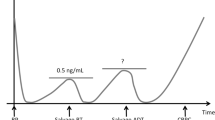Abstract
The present study was undertaken to examine biochemical progression in patients who received salvage hormonal therapy (HT) for biochemical disease recurrence (BCR) after radical prostatectomy (RP), and to determine the optimal timing for the administration of HT. The study population consisted of 156 patients who underwent RP and received salvage HT for BCR. The starting point of this study was the timing of RP, and the endpoint was biochemical prostate-specific antigen (PSA) progression (castration-resistance) after HT. The mean follow-up period after surgery was 8.1 years. First, we excluded 18 patients with persistent PSA (≥0.2 ng/mL) after RP from an analysis below because their prognoses were significantly poorer compared with 138 patients whose PSA nadirs had reached <0.2 ng/mL. Multivariate analysis demonstrated that Gleason score ≥8 (p = 0.010, hazard ratio (HR) 3.02), and PSA doubling time (PSA-DT) <6 months (p = 0.001, HR 7.39) was independently associated with subsequent biochemical progression after HT. Using these two variables (Gleason score and PSA-DT), we could stratify patients into three risk groups for BCR after salvage HT. Regarding the optimal timing for HT administration for these high-risk patients with both risk factors (relative risk = 22.3), the PSA cutpoint of 1.0 ng/mL at the initiation of HT showed a significant difference in progression-free survival rates (p = 0.023). The findings indicated that for high-risk patients, salvage HT for BCR after PSA nadir (<0.2 ng/mL) should be started before the PSA level exceeds 1.0 ng/mL; otherwise, there is a significant risk of subsequent biochemical progression after HT.


Similar content being viewed by others
References
Han M, Partin AW, Pound CR, Epstein JI, Walsh PC. Long-term biochemical disease-free and cancer-specific survival following anatomic radical retropubic prostatectomy. The 15-year Johns Hopkins experience. Urol Clin N Am. 2001;28:555–65.
Pound CR, Partin AW, Eisenberger MA, Chan DW, Pearson JD, Walsh PC. Natural history of progression after PSA elevation following radical prostatectomy. JAMA. 1999;281:1591–7.
Moul JW. Prostate specific antigen only progression of prostate cancer. J Urol. 2000;163:1632–42.
Bott SR. Management of recurrent disease after radical prostatectomy. Prostate Cancer Prostatic Dis. 2004;7:211–6.
The Medical Research Council Prostate Cancer Working Party Investigators Group. Immediate versus deferred treatment for advanced prostatic cancer: initial results of the Medical Research Council Trial. Br J Urol. 1997;79:235–46.
Makarov DV, Humphreys EB, Mangold LA, Carducci MA, Partin AW, Eisenberger MA, et al. The natural history of men treated with deferred androgen deprivation therapy in whom metastatic prostate cancer developed following radical prostatectomy. J Urol. 2008;179:156–61.
Zincke H, Lau W, Bergstralh E, Blute ML. Role of early adjuvant hormonal therapy after radical prostatectomy for prostate cancer. J Urol. 2001;166:2208–15.
Messing EM, Manola J, Yao J, Kiernan M, Crawford D, Wilding G, et al. Eastern Cooperative Oncology Group study EST 3886. Immediate versus deferred androgen deprivation treatment in patients with node-positive prostate cancer after radical prostatectomy and pelvic lymphadenectomy. Lancet Oncol. 2006;7:472–9.
Smith MR, Kabbinavar F, Saad F, Hussain A, Gittelman MC, Bilhartz DL, et al. Natural history of rising serum prostate-specific antigen in men with castrate nonmetastatic prostate cancer. J Clin Oncol. 2005;23:2918–25.
Kamidono S, Ohshima S, Hirao Y, Suzuki K, Arai Y, Fujimoto H, et al. Working group for creation of clinical practice guidelines for prostate cancer, the Japanese urological association: evidence-based clinical practice guidelines for prostate cancer (summary—JUA edition). Int J Urol. 2008;15:1–18.
Scher HI, Halabi S, Tannock I, Morris M, Sternberg CN, Carducci MA, et al. Prostate cancer clinical trials working group. Design and end points of clinical trials for patients with progressive prostate cancer and castrate levels of testosterone: recommendations of the prostate cancer clinical trials working group. J Clin Oncol. 2008;26:1148–59.
Maffezzini M, Bossi A, Collette L. Implications of prostate-specific antigen doubling time as indicator of failure after surgery or radiation therapy for prostate cancer. Eur Urol. 2007;51:605–13.
Mazumdar M, Glassman JR. Categorizing a prognostic variable: review of methods, code for easy implementation and applications to decision-making about cancer treatments. Stat Med. 2000;19:113–32.
Wong YN, Freedland S, Egleston B, Hudes G, Schwartz JS, Armstrong K. Role of androgen deprivation therapy for node-positive prostate cancer. J Clin Oncol. 2009;27:100–5.
Spiess PE, Lee AK, Busby JE, Jordan JJ, Hernandez M, Burt K, et al. Surgically managed lymph node-positive prostate cancer: does delaying hormonal therapy worsen the outcome? BJU Int. 2007;99:321–5.
Moul JW, Wu H, Sun L, McLeod DG, Amling C, Donahue T, et al. Early versus delayed hormonal therapy for prostate specific antigen only recurrence of prostate cancer after radical prostatectomy. J Urol. 2004;171:1141–7.
Ide H, Nakashima J, Kono H, Kikuchi E, Nagata H, Miyajima A, et al. Prognostic stratification in patients who received hormonal therapy for prostate-specific antigen recurrence after radical prostatectomy. Jpn J Clin Oncol. 2010;40:177–80.
Siddiqui SA, Boorjian SA, Inman B, Bagniewski S, Bergstralh EJ, Blute ML. Timing of androgen deprivation therapy and its impact on survival after radical prostatectomy: a matched cohort study. J Urol. 2008;179:1830–7.
Zietman AL, Dallow KC, McManus PA, Heney NM, Shipley WU. Time to second prostate-specific antigen failure is a surrogate endpoint for prostate cancer death in a prospective trial of therapy for localized disease. Urology. 1996;47:236–9.
Acknowledgments
There are no funding sources. There are no financial disclosures from any authors.
Conflict of interest
None.
Author information
Authors and Affiliations
Corresponding author
Rights and permissions
About this article
Cite this article
Matsumoto, K., Mizuno, R., Tanaka, N. et al. Optimal timing of hormonal therapy for prostate-specific antigen recurrence after radical prostatectomy. Med Oncol 31, 45 (2014). https://doi.org/10.1007/s12032-014-0045-1
Received:
Accepted:
Published:
DOI: https://doi.org/10.1007/s12032-014-0045-1




